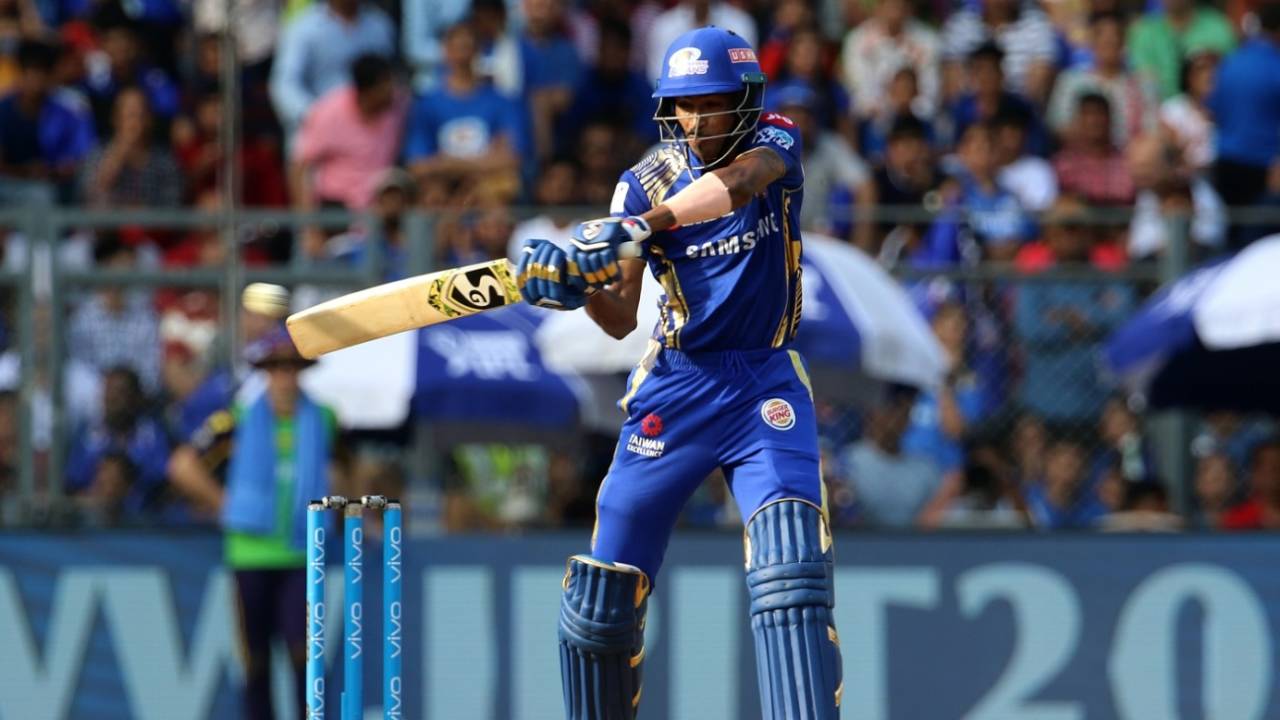Mumbai overcome their death-overs nerves
They kept losing close games at the start of the tournament, but on Sunday they made sure they didn't lose their way in the pressure moments
Vishal Dikshit at the Wankhede
06-May-2018
BCCI
Mumbai Indians lost a number of close matches early in the season, largely because of their end-overs struggles while defending totals after losing the toss. Sunday evening was unfolding in similar fashion when Dinesh Karthik asked Mumbai to bat again, and the death overs played a vital role once more. This time, however, Mumbai won the clutch moments and kept their playoff hopes alive. What did they do differently?
Bumrah and Hardik keep KKR quiet
Earlier in the tournament, Rohit Sharma had the cushion of two specialist death bowlers in Jasprit Bumrah and Mustafizur Rahman to defend totals. Now that Mumbai have dropped Mustafizur for Ben Cutting, the onus has fallen almost solely on Bumrah.
KKR needed 54 off the last four overs with Karthik and Andre Russell at the crease. Bumrah had two overs in the bank. Rohit decided to give him the 17th and 19th overs and push the equation beyond KKR by the time the final over began.
Bumrah gave his captain the perfect 17th over. To Karthik, he mostly bowled wide outside off, making him reach for the ball and denying him his favourite scoop over short fine leg. Against Russell, Bumrah avoided the full length he so relishes and cramped him with his angle into the body. The first three balls produced only singles, and with the pressure mounting, Russell top-edged another short ball from Bumrah, and Krunal Pandya pouched a spectacular catch running from short fine leg towards the square leg boundary.
The baton passed on to Hardik, who had figures of 2 for 13 with one over remaining. KKR needed 43 from 18 balls, and Hardik bowled a succession of slower balls and cutters to Sunil Narine and Karthik. Apart from one wide ball that Karthik cut for four, there was hardly any pace onto the bat, and Karthik kept swinging hard and failing to connect cleanly.
Only six came off that over, and even a 14-run 19th over from Bumrah - compounded by a drop from JP Duminy on the leg-side boundary - wasn't enough to swing the momentum back in KKR's favour.
The short-ball plan
The Wankhede pitch has plenty of bounce in it, but you need to know how to use it. Where KKR's fast bowlers conceded 8.40 per over while pitching short or short of a good length, Mumbai's quicks only went at 7.75.
They bowled 29 of those short or shortish balls in the Powerplay, with Mitchell McClenaghan leading the way. In the third over, he kept bowling short despite having only one fielder back on the leg side - deep backward square leg - for Chris Lynn. Lynn pulled one short ball to the midwicket boundary, and another just wide of the man at short fine leg, but McClenaghan didn't change either his length or his field. Off the fifth ball of the over, Lynn pulled again but straight into the hands of short fine leg.
When Hardik returned for his second spell in the 14th over, KKR needed a gettable 69 from 42 balls with seven wickets in hand. He kept bowling back of a length and conceded only five in the over. The third ball was banged in short at Nitish Rana, angling across the left-hander. Looking to pull from outside off stump, he failed to get on top of the bounce and skied a top-edge to deep square leg.
A batting-order rejig
Ever since his 94 against Royal Challengers Bangalore, Mumbai have maintained that Rohit Sharma will continue to bat at No. 4. On Sunday, though, he came out at No. 3, a position that has traditionally worked better for him. Mumbai also batted Hardik above Krunal, which hadn't been the case early in the tournament. The opening stand had lasted nearly 10 overs, and when the second wicket fell, only 50 balls were left in the innings. When Hardik came in, Mumbai were losing some momentum, with Rohit falling for a run-a-ball 11 and a fatigued Suryakumar Yadav slowing down after a brisk start.
Hardik got going quickly, lofting a one-handed six off his third ball, and failed to score off only three balls in a 20-ball innings. Even as the batsmen at the other end struggled to score quickly - JP Duminy finished on 13 off 11 - he went at a strike rate of 175, which proved crucial to Mumbai getting past 180.
Vishal Dikshit is a senior sub-editor at ESPNcricinfo
